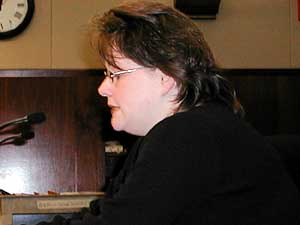Audio
Photos
Your Voice
| |||||||||||||||||||||||||||||||||||||||||||||||
House cuts to child care draw protests
April 14, 2003
A House panel is scheduled to vote Tuesday on a 600-plus page bill funding health and human services programs for the next two years. The bill would restore some of the governor's proposed cuts in funding for nursing homes and services for people with disabilities. To offset the additional funding, House Republicans would make deep cuts in child care subsidies.
St. Paul, Minn. — The House Health and Human Services bill would cut spending on child care assistance for low-income families about $75 million from current spending levels. Funding for the state's basic sliding fee program would be cut in half.
Child care assistance for parents in the state's welfare-to-work program would be cut by about 16 percent. Parents would pay higher premiums and income limits would be lowered.
Chad Dunkley, vice president of New Horizons Child Care, told lawmakers that they expect low-income families to work, yet many families won't be able to afford child care. Dunkley says Minnesota used to lead the nation in early childhood education.
 | |||
"I'm looking at these proposals -- they look very much like the same proposal in Arkansas and Mississippi," says Dunkley. "You might as well change the sign when we enter the state -- 'Welcome to frigid Arkansas!' I mean, what are we doing for Minnesota families? It's embarrassing."
Jennifer Hendry of White Bear Lake told legislators on the House Health and Human Services Committee that she can't afford the cost of daycare for her three children. Hendry works full time at the St. Paul Companies and her husband is self-employed. They pay $120 per month in basic sliding fees for their children's daycare -- which would otherwise cost nearly $1,200 every two weeks. Hendry says their premiums would likely triple under the House bill.
"I will be forced to quit my job, and we will have no choice but to apply for welfare, housing and medical assistance. We do not have funds available to pay for even half of what it costs to keep our children in daycare so that I can remain employed," Hendry says.
Child care advocates estimate more than 1,000 families will lose child care assistance immediately because of the lower income limits in the House bill. The bill's sponsor, Rep. Fran Bradley, R-Rochester, says his bill would preserve child care assistance for families least able to pay for it.
|
This is a matter of tough choices. If you compare it to someone in a group home or an elderly person who's completely vulnerable in a nursing home, I felt like it was a fair trade.
- Rep. Fran Bradley, author of the bill |
"I know that it's going to be a hardship for some people, but this is a matter of tough choices," says Bradley. "If you compare it to someone in a group home or an elderly person who's completely vulnerable in a nursing home, I felt like it was a fair trade."
Bradley's bill would spend $170 million more on health and human services than Gov. Pawlenty proposed. Bradley wants to restore some of the governor's proposed cuts to nursing homes, group homes and other services for the elderly and disabled.
His bill would also restore some funding for senior volunteer programs, such as foster grandparents and senior companions. Bradley says people involved in those programs made their case to lawmakers.
"Those people have successfully lobbied. They did a marvelous job of lobbying, I think especially in greater Minnesota. Those are extremely popular programs," he says.
Bradley says he doesn't plan to make any major changes in his bill as a result of the public testimony he heard in the last day. He says Democrats with concerns about the bill can try to amend it, but they'll have to stay within the overall dollar amount for health and human services spending.
In the Senate, DFL leaders say their bill will restore most funding for the state's subsidized health insurance program, and spend more than the House or governor's proposal. The bill isn't scheduled for a Senate committee vote this week.
|
News Headlines
|
Related Subjects
|


